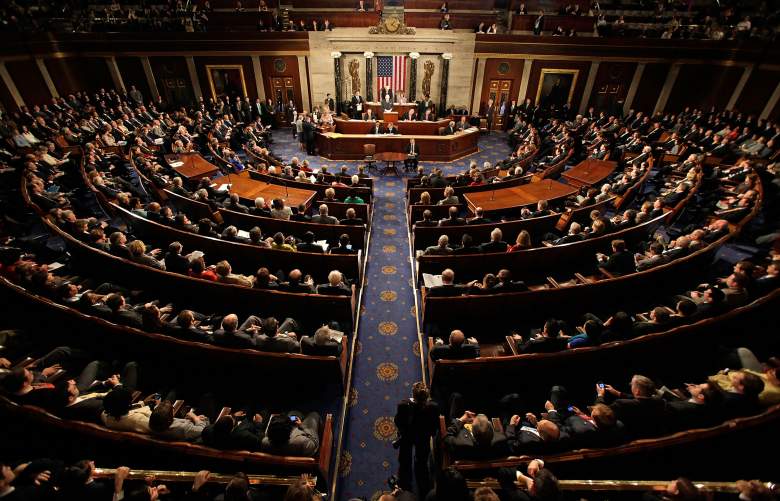
A joint session of Congress meets to count the Electoral College vote from the 2008 presidential election on January 8, 2009 in Washington, DC. (Getty)
The House of Representatives just voted to pass the American Health Care Act, the Republican party’s replacement for Obamacare. Now that the vote has taken place, what’s the next step? When will the American Health Care Act actually go into effect and start impacting average Americans?
Of course, now that the bill has passed the House, it must still pass the Senate and then be signed by the president, and so there’s still quite a long way left to go before the legislative process is even finished.
Assuming the bill makes it onto the president’s desk, there are a variety of provisions in it, and they all take effect at different times. It should be noted, though, that these dates may change in the final version.
One aspect of the American Health Care Act is that it does away with Obamacare’s individual mandate, the provision of the law that requires all Americans have health insurance. If the American Health Care Act becomes law, the individual mandate will immediately be scrapped; in fact, the repeal of the individual mandate applies retroactively to months after December 31st, 2015.
The employer mandate is also repealed under the American Health Care Act. This is the provision that says that any employer with more than 50 employees must provide health insurance or pay a penalty. With the passage of this bill, the employer mandate is ended immediately, and like the individual mandate, it applies retroactively to months after December 31st, 2015.
The American Health Care Act also phases out the state-by-state Medicaid expansion that occurred under Obamacare. But this will be more of a gradual process, and the Medicaid expansion will end on December 31st, 2019.
For low-income families, Obamacare provided a Premium Tax Credit to be used to purchase health insurance. The American Health Care Act gets rid of this, but only after December 31st, 2019. The bill also repeals the Small Business Tax Credit, a credit for businesses with fewer than 25 employees making $50,000 or less per year. Once again, this is effective December 31st, 2019.
To replace this, the American Health Care Act will begin offering the following age-based tax credits:
- Under 30: $2,000
- Between 30 & 39: $2,500
- Between 40 & 49: $3,000
- Between 50 & 59: $3,500
- Over 60: $4,000
Under Obamacare, over-the-counter medications are not included as a qualified medical expense that taxpayers can be reimbursed for when using tax-advantaged health savings accounts. Under the American Health Care Act, over-the-counter medications will count as qualified medical expenses. This goes into effect after December 31st, 2017.
The Affordable Care Act also repeals the 2.3 percent excise tax on certain medical devices; the tax will be repealed on December 31st, 2017. Speaking of repealing taxes, the Medicare Hospital Insurance surtax, imposed on taxpayers at a rate equivalent to 0.9 percent of that employee’s wages, is repealed, and it will not be in effect after December 31st, 2017.
Obamacare’s indoor tanning tax would also be repealed beginning in 2018, as would the net investment tax and the health insurance tax.
Finally, the McArthur Amendment was recently added to the American Health Care Act. This allows states to receive waivers from certain provisions of the American Health Care Act, but only after January 1st, 2018. It’s this aspect of the bill which has caused a bit of controversy, as with this waiver, insurance companies could charge those with pre-existing conditions higher prices if they do not maintain continuous coverage. But again, this doesn’t take effect until next year, and it may or may not apply to you depending on whether your state receives the wavier. Also, the insurance company could only charge those with pre-existing conditions a higher price for one year.
If you’re under 26 and are currently on your parents’ health care plan, you will not experience any changes, as the American Health Care Act keeps this provision of Obamacare in place.